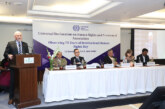NAIROBI: UN Environment acting executive director Joyce Msuya congratulated Prime Minister Narendra Modi for taking the lead in putting a timeline to eliminate the consumption of single-use plastic by 2022. Still, the Indian government, she feels, needs to take tough decisions to confront the burning issue of air and water pollution.
In an exclusive interview with TOI, Msuya spoke extensively about the environmental challenges faced by India, which, she stressed, can set an example to others in the region if it addresses these challenges urgently.
 While plastic pollution has become a major concern worldwide, few nations have shown the resolve to tackle the issue. But on Friday, the UN Environment Assembly (UNEA), which concluded in Nairobi, reviewed a roadmap for a plastic-free planet. To reach this target, many countries, including India, have offered to share knowhow, and develop and implement legislation against the use of harmful single-use plastic and micro-plastics.
While plastic pollution has become a major concern worldwide, few nations have shown the resolve to tackle the issue. But on Friday, the UN Environment Assembly (UNEA), which concluded in Nairobi, reviewed a roadmap for a plastic-free planet. To reach this target, many countries, including India, have offered to share knowhow, and develop and implement legislation against the use of harmful single-use plastic and micro-plastics.
While talking about India’s role in the South Asia region, Msuya said, “With a large talented human capital and technological innovation, India has a big potential in resolving environmental issues. As India continues to play a leadership role in many segments, this is high time the country plays a leadership role in dealing with environmental challenges in the region.”
Msuya appreciated the civil society in India for working as a pressure group to address various environmental concerns.
“I often travel to New Delhi and notice that there is a lot of awareness among people on rising air pollution. Civil society puts pressure on politicians as they are taxpayers or future taxpayers. They are continuously raising their voice for clean air and environmental protection. We also see that Indian citizens are quite enthusiastic on social media. Many times they use social media to press the authorities to save the environment and bring technological innovation to address environmental issues. All of this is a really positive sign,” she said.
Msuya relates very well to Indians battling with air pollution as she lived in Beijing for over three years. “I moved to Beijing with my husband and children in 2011. When my son wanted to go out to play football, my job as a mother was to check the levels of PM2.5. Every morning, the first thing I used to do was to look at the temperature and the levels of PM2.5 (fine particulate matter). Air pollution used to influence my decision, whether my son should go out at all or if he should go out with a mask. The situation in China was really bad that time. However, things have changed in Beijing now and India can learn a lot from the Beijing experience,” she said.
The UN environment acting chief feels that three major factors – clear and targeted plans of the Government of China, strategical shifting of manufacturing units to different states, and huge engagement of the citizens demanding a call of action on pollution – helped China bring down air pollution in Beijing.
According to Msuya, the UN’s call for India is to bring a ‘sense of urgency’ to resolve environmental issues. “The positive thing about India is that there is already an awareness and some policy decisions to tackle pollution. However, the government has to take extremely tough decisions. We encourage the Indian government to push for a sense of urgency. There have been reports that indicate the impact of pollution on health and budgets of the countries. Our call for India is therefore to speed up with what they have already started,” she said.
When asked how the UN is working on engaging India with other Asian nations over use of clean technology and green solutions, Msuya said, “I lived in Asia for six years. When I was in South Korea, we used to host government delegations from both India and China to see and learn about an e-mass mobility system (electric buses). We can, therefore, certainly provide a platform where countries can learn from each other. Even though we recognise that India and China are very different culturally and politically, two countries can have research and peer-to-peer exchanges to tackle the problem of air, water and plastic pollution. Also, they can learn about policy innovation.”
In order to tackle most of the environmental concerns in India, Msuya suggested the country to engage the private sector to have technological innovative, clean alternatives; to involve mass media and civil society groups to spread awareness beyond big cities, and to have policy innovation.
“You have dynamic entertainment industry Bollywood. Celebrities can come forward to not only spread awareness, but promote innovative solutions and press the authorities to have policy innovation.”
By Shilpy Arora|TNN|March 20, 2019|08:49 pm



